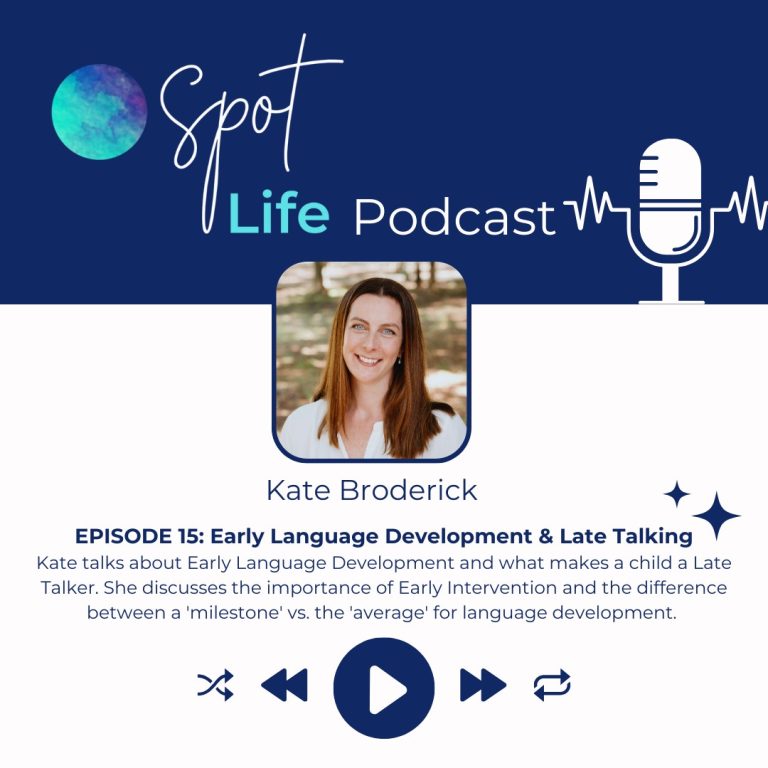

Kate talks about Early Language Development and what makes a child a Late Talker. She discusses the importance of Early Intervention and the difference between a 'milestone' vs. the 'average' for language development. Kate finishes the episode with practical strategies to support early speech and language development.
In this episode, Kate discusses early language development and late talking. Parents, carers and educators should look out for children that are developing differently or seem to be experiencing the world differently from their peers. Early intervention is a powerful tool that can support families in their journey in raising happy children who feel secure, understood, valued and supported in those very earlier years of life which are so formative in terms of our future relationships and emotional wellbeing, our learning and our life.
If it has crossed your mind that a child might benefit from support – or perhaps even if the need for support is more overtly observable in the parents who expresses stress, fatigue or worry, then we encourage you to check in with a Speech Pathologist to see if there is something that can be added into your daily routine to support the development of play, breathing, oral-motor skills, feeding or overall development. For example, chewing is directly related to speech and kids who have difficulties with oral motor skills are also more likely to have ear infections.
Don’t just put daily struggles down to behaviours that are perceived as ‘normal’ alone. Children, regardless of age or gender are entering this world to develop relationships and are ready to learn. If a child seems like they are finding that process harder than others, they deserve the support they need to help them along the road.
In Australia, we know that a lot of kids start school with delays in their oral language, which places them at risk of ongoing issues at school like trouble with reading and numeracy, which over time can affect friendships and self-esteem. Early intervention can reduce this risk and change the child’s trajectory. Consulting a Speech Pathologist will not give your child communication difficulties. It will open the gateway to accessing support that can be built into your everyday life. Early intervention is all about foundational skills (joint attention and play – basically learning to learn).
A Speech Pathologist can reassure you that your child seems to be developing on track. A happy, relaxed parent, who knows that are accessing advice from a professional who has specialist knowledge in the area, will free up a parents’ emotional capacity for connection (in the place of worry), and in turn – they will experience more joy in relationships and ongoing general progress in development.
Late talkers are children who have a very limited vocabulary, or talks very rarely, or even have no speech at all. Most of the time, children who are considered late talkers will have typically developing play, motor and cognitive skills, as well as a good understanding of language.
However, sometimes we meet children presenting as late talkers, who will go on to have long term delays in their language (and may receive a diagnosis, e.g., Developmental Language Disorder). We see some kids who respond well to early intervention with regard to their talking but who do pop up later on with delays in their literacy and learning at school age. These are children we need to keep on our radar as we know that they are at risk. So even if a teacher gives feedback that a child is experiencing ‘mild’ delays, we need to address any issues as soon as possible, knowing that this child has needed speech therapy in the past. A positive is that we know this child has positively responded to therapy in the past and likely will and should respond positively again now and if needed, in the future.
We also see kids whose late talking fits within a neurodevelopmental profile. They may be autistic. They may have an anxiety disorder like selective mutism. They may have a motor-speech disorder like apraxia.
Often, Speech Pathologist cannot make a guaranteed differential diagnosis in one appointment. This is why Kate believes the best practice is to see children over a few weeks. Typically, we don’t expect 2 years olds to rock up at a new place like our office (as friendly and warm as it may be) and open up to show all the best skills. We need to give children the time and space to relax and build rapport. The clinic context can also help with differential diagnosis – sometimes we will get to see children coping with a new environment and people, differently to the neurotypical, and this too helps us to better understand the range of developmental factors that could be contributing to their late talking.
Typically-developing language milestones
So, what should you expect for your child’s language development?
Between 7 to 12 months, we are expecting to see a child babbling in single syllables, for example “ba ba” or “ma ma”. Later on, we are expecting babbling to emerge as repeated strings of different syllables (we call this variegated babble). This can sound like “bamagema” or “bapapa”.
As children develop and reach the 12-month mark, first words emerge and you will notice them producing simple words. They can be “mama” or “dada”, or sometimes they can be words that are more common such as “ball” or “water”. They can even say variations of these words – for example, “wawa” for water.
At 18 months, children are expected to have about 20 to 50 words in their vocabulary. At this stage, they begin to combine words. If your child is combing words – this is a sign, without having to count all their words, that they probably have at least 50.
At 24 months kids should have a set of at least 100 words (but many other will have closer to 300-500), and they are able to combine those into 2-3 word sentences. This can sound like “mommy go there!”, “eat cookie” or “what’s that?”. They should be using language to have their needs met and to build relationships.
By 3 years of age, children are expected to use 3 to 4 words in full sentences. They should be able to use accurate grammatical structures in their language.
Things to look out for in late-talkers
If your child is only using less than 20 different single words at 18 months – that can be a noun, verb, adjectives, and even social words, consider a Speech Pathologist to review for some guidance on language stimulation strategies.
Also, if your child is not combining 2 words together, such as, “shoe on, “ “bye dada” “all gone” or “more water”, in short phrases at 24 months – reach out for some support.
Also – if you know there is a family history of speech or language delays, or a medical history that is significant (like ear infections or reflux), get help sooner.
What can you do if you think your child is a late-talker?
Get a hearing test! Children learn language and how to speak by listening to their environment in their toddler and preschool years. Small changes in hearing can affect the sounds they can hear.
It is also worth consulting a Speech Pathologist to get a clearer idea of where your child’s language skills are at. Speech Pathologists are able to assess all areas of your child’s speech, language and communication. This could include using standardized assessments as well as observing your child in play. From there, we can put in place appropriate intervention that is evidence-based.
In short, if you are concerned that your child is late to talk, speak to a Speech Pathologist. If your child’s skills appear to be behind those of his or her siblings, or even peers, contact a Speech Pathologist!
Some parents may wait it out and hope their child will catch up. While this may be true for some children, there’s no evidence to show children are more likely to catch up without further intervention. In fact, early intervention is key, and there has been lots of research on the efficacy of early intervention. Studies have shown early intervention can be effective in treating language disorders and can help in preventing later communication and learning difficulties.
An evidence-based program that has been widely used is the Hanen It Takes Two to Talk Program. The program involves parents learning and using strategies to promote their child’s early language development.
In the meantime, there are some strategies you can try at home to help your toddler.
If your child is not speaking yet, you can try some of these strategies:
In short, if you’re concerned that your child is a late-talker, consult a Speech Pathologist as soon as you can. This can reduce the risk of further language and learning difficulties when your child reaches school age.
For more information or to book in an assessment, contact us at spottherapyhub@gmail.com. More topics on our blogs on spottherapyhub.com.au and listen to other podcast episodes on Spotify or Apple Podcast!

